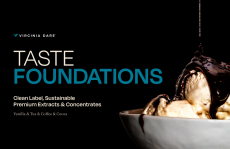FIRMS SEE UNTAPPED POTENTIAL IN CLEAR, FUNCTIONAL BEVERAGES
Stepan Lipid Nutrition and Virun paint bold brushstrokes on clear beverage ‘canvas’

Philip Bromley, CEO of Californian biotech firm Virun, told BeverageDaily.com that the tie-up was a good opportunity for his firm, given the scale of nutritional oil player Stepan, which works across many different industries beyond food and beverages.
“This adds to our credibility, and also allows us access to their unique lipid lineup, since Stepan is, for instance, one of the top CLA (conjugated linoleic acid) suppliers worldwide,” Bromley said.
CLA is a polyunsaturated fatty acid that occurs naturally and is found in the average diet, primarily in meat and dairy products from grass-fed ruminants such as cattle.
2013: CLA’s beverage breakthrough?
It has a long history of supplement use, but only received GRAS approval in 2008. Studies show it can help reduce body fat, maintain lean muscle mass and improve body composition.
Could 2013 be CLA’s food and beverage breakthrough year? Stepan estimates that CLA sales total $33m annually in the US at ingredient level.
Only Stepan and BASF hold licenses (from the University of Wisconsin) to market and sell CLA for food (where this includes beverage) use.
Emile Henein, global business development manager at Stepan, agreed with Bromley that some supplements categories such as soft gels, or supplements containing omega 3s, were reaching saturation point, whereas beverages held clear growth potential.
Henein told BeverageDaily.com:“There’s a complement for Virun’s technology given the interest in clear beverage applications, in what would otherwise be better off in a cloudy emulsion, due to fat triglyceride content of our ingredient Clarinol CLA.”
Customers demand point of difference
Discussing market dynamics, Bromley said:“When you talk to customers who want to launch a new product, 90% of them say: ‘I don’t want another ‘me too’ product.’
“’What can you give me that’s different?’ they say. And that feeds into functional beverages, because you really have this clean white canvas you can paint on.
“There’s so many different applications you can choose from. I mean, who does omega-3 in red grape juice? And the same with black grape juice, cranberry juice?
“Or alternatively, functional-type beverages like sports drinks or vitamin-type waters. Together we can develop something unique for the customer.
Henein explained that one customer, GNC, had partnered actor Mark Wahlberg to offer protein-based sports drinks containing Clarinol CLA under the ‘Marked’ brand.
‘New, jazzier’ supplement sectors
While it wasn’t Stepan’s role to push the celebrity agenda, Henein said such brands did create “pockets of space” that meant market opportunities for healthier beverages.
Whereas the mature end of the supplement space lay in pills, he said, “new, jazzier sectors” involved applications such as drinks that could elicit greater consumer acceptance and provide a vehicle for the last 5/6 years of supplement innovations.
“In Virun’s space it’s a clear emulsion, that’s like the holy grail. How do you make a fat/oil product that’s happy in a cloudy, emulsion state, into a clear emulsion state?" Henein said.
“At least we [Stepan] are doing something in beverages, as opposed to some in the market, who sit and analyze whether to go or not, for endless months, years.”
‘Energy jolt plus…CLA?’
Beverages enabled Stepan to tap new demographics, Henein said, since although sports nutrition devotees had no problem with taking 3-4 pills/day then hitting the gym, this was clearly problematic for teenagers or women in their 30s and 40s.
“It’s about going to already health-conscious consumers who have been sceptical about supplements, because of all the sensational news they’ve seen regarding doping and bodybuilding or sports nutrition,” Henein said.
Meanwhile, CLA could succeed with consumers in the 3oz energy shot space, Henein and Bromley agreed, as an ‘energy jolt plus…’ proposition promising weight management and satiety effects, while a ‘lean muscle’ positioning also held promise.
“5-Hour Energy did over 900m shots last year, almost a billion a year in the energy shot category. But the only products that you see hitting the market are shots, but they’re energy products and they can’t compete with 5-hour,” Bromley said.
















